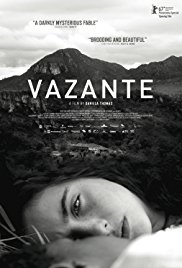‘Vazante’ is an impactful, bleak 19th century story
Directed by: Daniela Thomas
Written by: Daniela Thomas and Beto Amaral
Starring: Adriano Carvalho, Luana Nastas, Roberto Audio, Sandra Corveloni, and Fabricio Boliveira
“Vazante” – Looking back at history, one could claim that 1821 was a celebratory year.
Greece gains independence from Turkey.
The Saturday Evening Post prints its first edition.
Costa Rica, El Salvador, Guatemala, Honduras, and Nicaragua declare their independence from the Spanish Empire.
James Boyd patents the rubber fire hose.
These events are worthy enough to applaud and cheer, but in the same year, there is no merriment on Antonio’s (Adriano Carvalho) farm, located in the Diamantina Mountains, Brazil.
In “Vazante”, he owns a massive parcel of land, complete with 20 or 30 slaves, but Antonio was in the diamond business. Most unfortunately, the diamond mines have literally and figuratively lost their sparkle, and future prospects look grim.
The mines are empty. With one look at Antonio, the word grim best describes him.
With a thick tuft of curly hair accompanied by a lengthy beard, his eyes - almost always - are spilled wide-open and alert, like he is itching for a gunfight, and his lips are tightly pressed, seemingly on the verge of opening for a primal scream.
Antonio, though, may not possess the vitality for such a scream. His spirit is tired, worn-out and defeated, especially after a brutal personal tragedy. Enter his brother Bartholomeu (Robert Audio) and his family, and they stay with Antonio on the farm. The brothers are not exactly friendly. They are not sworn enemies either, so this new sibling dynamic does not dramatically change the narrative, except in one respect: Bartholomeu’s daughter, Beatriz (Luana Nastas).
Director/co-writer Daniela Thomas spins a purposely bleak family tale and under a backdrop of glorious black and white, and her visual choice underscores the specific period and the regressive decisions made by the film’s characters. She certainly sets a tone. For instance, while Antonio and his slaves march through a tree-filled countryside under steady rain, one can almost imagine the lush colors that these men are experiencing all around them, but Thomas wipes these flushes of green, blue and yellow away. The audience is left with a muffled – but also a crystal clear – window that dampens the mood both on-screen and in the theatre, not unlike Michael Haneke’s haunting German drama “The White Ribbon” (2009) or Nicolas Pesce’s horror film “The Eyes of My Mother” (2016).
“Vazante” is not a horror film, but Thomas gives moviegoers barely anything to smile about during 1 hour and 56 minutes of agonizing, but also fascinating, screen time. From an agonizing perspective, Antonio and his foreman, Jeremias (Fabricio Boliveira), utter curt commands to the homemakers and field hands, as these orders are met with assured, quiet obedience and zero serenity.
No one wants to live or work there.
It’s not just the slaves, but Bartholomeu’s wife, Dona Ondina (Sandra Corveloni), refers to Antonio’s farm as hell. Hell might be a stretch, but the onsite oppression, hours and hours of work and other moments of complete boredom certainly are heated in misery.
This miserable, cringe worthy experience is balanced by Thomas’s filmmaking gifts. She completely transports her actors and audience to a desolate, desperate otherworld of grey emotional tones: simpleminded thinking, oppression, racism, and sexism, but not through much dialogue, because spoken words are sparse.
Thomas channels Werner Herzog and hustles through hilly terrain and reveals difficult horseback journeys. Other times, she simply plants her camera and holds specific shots for a few more seconds than is comfortable to repeatedly raise unease. For instance, an ordinary – supposedly friendly - dinner between Antonio and Bartholomeu becomes a distressing experience with blank stares and silence filling the dining room and the big screen.
For Beatriz, she faces a most distressing experience too. For this poor girl, her choices are extremely limited which provide her very little reason to celebrate. I predict that audiences will not celebrate this picture either, but that’s not the point.
(3/4 stars)
Jeff – a member of the Phoenix Critics Circle – has penned film reviews since 2008 and graduated from ASU’s Walter Cronkite School of Journalism. Follow Jeff and the Phoenix Film Festival on Twitter @MitchFilmCritic and @PhoenixFilmFest, respectively.










